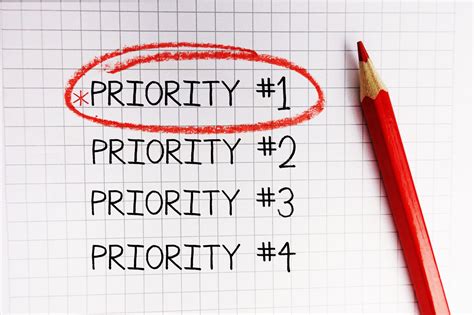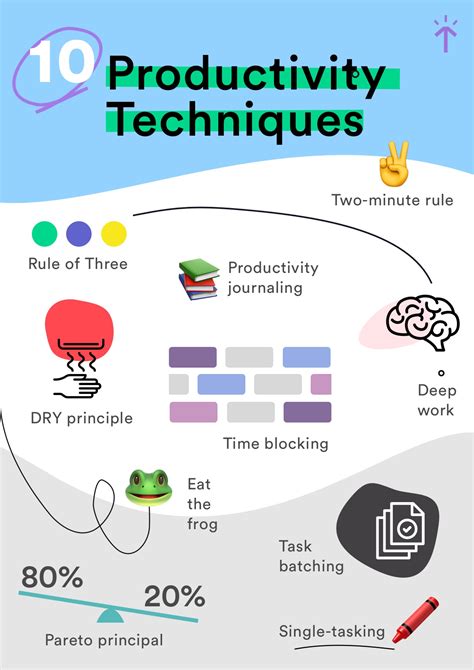Time is an invaluable resource that often slips through our fingers, leaving us feeling overwhelmed and unaccomplished. Mastering the art of managing time efficiently is crucial for achieving personal and professional growth. By adopting a few simple yet powerful techniques, you can transform your day-to-day routines and conquer the challenges that hinder your productivity.
Discovering the secrets to effective time allocation requires a focused and dedicated approach. The ability to prioritize tasks, set realistic goals, and eliminate unnecessary distractions can dramatically enhance your efficiency and empower you to make the most of each moment. This article presents ten insightful strategies that will help you unlock your full potential and maximize your time management skills.
Have you ever wondered why some people effortlessly excel in achieving their objectives while others constantly struggle to meet deadlines? The answer lies in their ability to harness time, maneuvering it in a manner that optimizes their productivity and minimizes stress. Developing a strong foundation in time organization is crucial not only for professionals but for anyone seeking a balanced and fulfilling life. Through this article, you will gain valuable insights and practical tips that can revolutionize the way you approach time management.
Prioritize Your Tasks

Organize and rank the importance of your tasks to optimize your productivity and achieve your goals efficiently.
When managing your workload, it is crucial to prioritize tasks based on their significance and urgency. By prioritizing effectively, you can focus your time and energy on completing the most important and time-sensitive tasks first, ensuring that you make the most of your available resources.
One way to prioritize tasks is by using the Eisenhower Matrix, which categorizes tasks into four quadrants: urgent and important, important but not urgent, urgent but not important, and not important nor urgent. By identifying the quadrant that each task falls into, you can allocate your time and attention accordingly.
Another helpful technique is the ABC method, where you assign a letter to each task to denote its priority. Tasks labeled 'A' are the most important and require immediate attention, while tasks labeled 'B' are less urgent but still important. 'C' tasks are those that can be delegated or done at a later time.
Remember to consider deadlines, potential consequences, and the impact of each task on your long-term goals when prioritizing. It is also essential to regularly review and reassess your priorities, as circumstances and deadlines may change.
By prioritizing your tasks effectively, you can improve your time management skills and achieve greater efficiency in your daily activities. Emphasizing important tasks and minimizing distractions will enable you to make progress towards your goals and maintain a healthy work-life balance.
Setting Clear Objectives
Having a clear direction and purpose is essential for effective time management. By setting clear goals, you can stay focused, prioritize tasks, and make efficient use of your time.
When you have well-defined objectives, it becomes easier to organize your workload and allocate your time effectively. Clearly stating what you want to achieve helps you understand the necessary steps to take and the order in which you should approach tasks.
- Define your goals using specific and measurable terms. Instead of saying "I want to be more productive," specify "I want to complete five tasks by noon."
- Break down larger goals into smaller, more manageable tasks. This allows you to focus on one task at a time and maintain momentum.
- Rank your objectives based on importance and urgency. Prioritize tasks that align with your long-term goals or have immediate deadlines.
- Set deadlines for each objective to create a sense of urgency and motivation.
By setting clear goals, you gain clarity on what needs to be accomplished and can effectively plan your time accordingly. This helps you stay organized, motivated, and ensures you are making progress towards your desired outcomes.
Break down tasks into smaller, manageable steps

One effective approach to enhance your ability to manage time efficiently involves breaking down tasks into smaller and more manageable steps. By dividing larger tasks into smaller components, you can not only make the overall workload seem more feasible but also approach it with a clearer focus and direction.
When faced with a complex task, it can be overwhelming to tackle it all at once. However, by breaking it down into smaller steps, you can create a clear roadmap of actions required to complete the task. This approach allows you to allocate appropriate time and resources to each step, ensuring that you stay on track and make consistent progress.
| Benefits of breaking tasks into smaller steps: |
| 1. Enhanced clarity: Breaking tasks down provides a clearer understanding of what needs to be done and in what order. |
| 2. Reduced overwhelm: Handling smaller steps at a time helps minimize stress and prevents the feeling of being overwhelmed. |
| 3. Improved focus: By concentrating on one step at a time, you can maintain better focus and prevent distractions from derailing your progress. |
| 4. Efficient resource allocation: Dividing tasks enables you to allocate time and resources more efficiently to each step, ensuring optimal utilization. |
| 5. Enhanced productivity: The ability to approach tasks in a structured manner translates to increased productivity and more successful outcomes. |
By implementing the practice of breaking tasks into smaller, manageable steps, you can effectively optimize your time management skills and accomplish tasks with greater ease and efficiency.
Avoiding Multitasking
Enhance your ability to manage time effectively by focusing on one task at a time and avoiding the temptation to multitask. In today's fast-paced world, it can be easy to overextend ourselves and try to tackle multiple tasks simultaneously. However, studies have shown that multitasking actually leads to decreased productivity and lower quality of work.
By dedicating your attention to one task at a time, you can give it your full focus and ensure that it is completed efficiently and to the best of your ability. This approach allows you to fully engage with the task, minimize distractions, and achieve better results. Furthermore, by avoiding the distractions that come with multitasking, you can maintain a higher level of concentration, leading to improved overall productivity.
Instead of getting overwhelmed by multiple tasks, prioritize them based on their importance and urgency. Set realistic goals and allocate specific time slots for each task, allowing yourself to fully concentrate on one thing at a time. By giving yourself designated blocks of time to work on each task, you can avoid the stress and confusion that come with trying to juggle multiple responsibilities simultaneously.
Create a Daily Schedule

Effectively managing your time entails organizing your day in a way that maximizes productivity and minimizes wasted time. One practical approach to achieve this is by creating a daily schedule. By creating a clear outline of your day, you will be able to prioritize tasks, allocate time for different activities, and stay on track towards achieving your goals.
Identify your priorities: Before creating your daily schedule, it is essential to identify your priorities. Determine the most important tasks or activities that need to be accomplished during the day. Prioritizing will help you allocate time and attention to the activities that truly matter.
Break down your tasks: Divide your tasks into smaller, manageable chunks. Breaking down tasks into smaller sub-tasks allows for better focus and concentration. Additionally, it enables you to estimate the time needed for each task more accurately.
Set realistic timeframes: When creating your daily schedule, be realistic about the time it takes to complete each task. Avoid overestimating or underestimating the time needed, as this can lead to inefficiencies or unfinished tasks. Consider past experiences and any external factors that might affect the duration of a task.
Allocate time for essential activities: In addition to work-related tasks, allocate time for essential activities such as breaks, meals, exercise, and personal rejuvenation. Neglecting self-care can negatively impact overall productivity and well-being. Incorporate these activities into your schedule to maintain a healthy balance in your daily routine.
Utilize time blocks: Time blocking involves allocating specific time blocks for specific activities. This technique helps create a structured and focused approach to managing your time. Assign dedicated blocks for tasks that require significant attention or creative thinking.
Be flexible: While it is important to stick to your schedule as much as possible, it is essential to be flexible and adapt to unforeseen circumstances. Unexpected events or urgent tasks may arise, requiring you to adjust your schedule accordingly. Build in some buffer time that can accommodate changes without derailing your entire day.
Eliminate distractions: Minimizing distractions is crucial for maintaining focus and increasing productivity. Identify potential distractions in your environment and take necessary measures to eliminate or minimize them. This could involve turning off notifications on your phone, finding a quiet workspace, or using noise-cancelling headphones.
Review and adjust: Regularly review your daily schedule to assess its effectiveness and make necessary adjustments. Reflect on your accomplishments and areas that need improvement. By continuously evaluating your schedule, you can identify patterns, optimize your time management strategies, and refine your schedule for better outcomes.
Practice discipline: Stick to your schedule as closely as possible. Developing discipline and self-control are essential for effective time management. Avoid procrastination and resist the temptation to deviate from your planned activities. Remember that consistent adherence to your schedule will lead to greater productivity and accomplishment of your goals.
Embrace productivity tools: Take advantage of various productivity tools and apps that can assist you in managing your time effectively. From task management applications to time tracking tools, there are numerous options available to help streamline your workflow and enhance your time management skills.
Mastering the Art of Saying "No"
Do you often find yourself overwhelmed with tasks and responsibilities? Are you constantly juggling multiple commitments and struggling to find time for yourself? Learning to say "no" can be a powerful tool in improving your time management skills and reclaiming control of your schedule.
Setting boundaries is essential in maintaining a healthy work-life balance. By politely declining requests and invitations that do not align with your priorities or values, you can create more time and mental space for the things that truly matter.
Learning to say "no" requires assertiveness and a clear understanding of your limits. It can be difficult to turn down opportunities or obligations, especially when you fear disappointing others or missing out on something important. However, it is crucial to recognize that every "yes" to someone else's agenda is a "no" to your own needs and goals.
Polite, but firm refusals can help you maintain healthy boundaries while also preserving relationships. Express your gratitude for the offer, but explain that you currently have other commitments that require your attention. It is important to be respectful and honest, without feeling the need to justify or over-explain your decision.
Learning to say "no" also means prioritizing your own well-being. It is not selfish to put yourself first and protect your time and energy. Taking on too much can lead to stress, burnout, and decreased productivity. By saying "no" to tasks or projects that do not align with your goals or values, you can create more opportunities for growth and success in areas that truly matter to you.
Practice makes perfect. Saying "no" can initially feel uncomfortable or even scary, especially if you are accustomed to always saying "yes" to others. However, with practice and self-reflection, you can become more comfortable asserting your boundaries and advocating for your own needs.
In conclusion, learning to say "no" is an essential skill in effective time management. By setting boundaries, being assertive, and prioritizing your well-being, you can create more time and space for the things that truly matter in your life.
Eliminate Distractions and Stay Focused

In order to optimize your ability to manage time effectively, it is essential to minimize the various factors that divert your attention and hinder your productivity. By eliminating distractions, you can maintain a laser-like focus on your tasks and accomplish them more efficiently.
- Avoid accessing social media platforms or any other websites that tend to pull you away from your work consistently. These distractions can consume a significant amount of your time and prevent you from completing important tasks.
- When working, make sure to keep your phone on silent or in a different room to prevent interruptions caused by incoming calls or messages. This will allow you to concentrate on your work without getting constantly tempted to check your phone.
- Organize your workspace and remove any unnecessary clutter that might cause distraction. A tidy and well-organized environment can help you stay focused and improve your overall productivity.
- Establish clear boundaries with colleagues or family members to minimize interruptions during designated work time. Let them know when you need uninterrupted focus and ask for their cooperation.
- Consider using productivity apps or browser extensions that block certain websites or limit your access to them during specific periods. These tools can help you overcome the temptation of distraction and maintain your concentration on important tasks.
- Take regular breaks, but ensure they are purposeful and focused. Engage in activities that recharge your energy levels instead of getting caught up in unproductive distractions during your break time.
- Identify and address any internal distractions, such as negative thoughts or worries, that can hinder your ability to stay focused. Practice mindfulness techniques or seek professional help if necessary to quiet your mind and enhance your concentration.
- Create a schedule or to-do list that outlines your priorities and deadlines. By having a clear plan, you can stay focused on accomplishing tasks instead of getting distracted by less significant activities.
- Work in a quiet and peaceful environment whenever possible. Loud noises or disruptions can break your concentration and impede your ability to effectively manage your time.
- Develop self-discipline and hold yourself accountable for minimizing distractions. Consistently remind yourself of the importance of staying focused and the benefits it brings to your overall productivity and success.
By making a conscious effort to minimize distractions in your work environment and personal life, you can significantly enhance your time management skills and accomplish more in less time. Remember, staying focused and eliminating distractions is key to achieving your goals efficiently.
Delegate Responsibilities When Possible
The art of effective time management involves more than just individual skills and personal organization. It also entails recognizing when and how to delegate tasks to others. Delegation is a strategic practice that allows you to distribute responsibilities among team members or colleagues, empowering them to contribute their unique skills and expertise to the overall success of a project or task.
By delegating tasks, you not only alleviate some of your own workload, but you also foster a sense of teamwork and collaboration within your team or organization. Delegation enables you to focus your energy and attention on more critical aspects of your work, such as decision-making and problem-solving, while ensuring that tasks are assigned to individuals who possess the necessary skills and knowledge.
When delegating responsibilities, it is important to clearly communicate your expectations and provide adequate guidance and support to those you are assigning tasks to. This helps to ensure that the tasks are completed accurately and efficiently, without causing unnecessary stress or confusion.
Delegation also has the added benefit of fostering professional development and growth, as it gives individuals the opportunity to expand their skill set and take on new challenges. By entrusting others with responsibilities, you not only empower them to learn and grow, but you also cultivate a sense of trust and confidence within your team.
However, it is important to remember that delegation should be done judiciously. Not every task or responsibility can or should be delegated. It is crucial to assess the complexity, urgency, and significance of each task before deciding whether it is suitable for delegation. Additionally, it is essential to consider the qualifications, availability, and workload of potential delegates to ensure that the task is assigned to the most appropriate individual.
In conclusion, delegation is an essential skill for effective time management. By prioritizing and distributing tasks wisely, you can optimize your own productivity while fostering collaboration and growth within your team. Utilize delegation as a strategic tool to leverage the skills and expertise of others and achieve collective success.
Take Regular Breaks

In order to enhance your ability to manage time effectively and optimize your productivity, it is essential to incorporate regular breaks into your schedule. These intervals of rest and relaxation provide a valuable opportunity to rejuvenate, refocus, and rejuvenate your mind and body.
While it may seem counterintuitive, taking breaks actually enhances overall productivity. Stepping away from tasks for brief periods allows your mind to rest and recharge, enabling you to maintain concentration and mental clarity throughout the day. Moreover, breaks can prevent burnout and help maintain a healthy work-life balance.
During your breaks, it is important to disconnect from work-related activities and engage in activities that promote relaxation and mental well-being. This could include stretching, going for a short walk, practicing mindfulness or deep breathing exercises, or simply enjoying a moment of solitude. By engaging in such activities, you are giving yourself a chance to recharge and return to your tasks with increased focus and efficiency.
Another benefit of taking regular breaks is the opportunity to gain fresh perspectives and insights. Stepping away from a task or problem allows your mind to process information in the background, often leading to new ideas or solutions. By giving yourself this mental space, you become more open to creative thinking and problem-solving.
It is important to note that the duration and frequency of breaks may vary depending on individuals and the nature of their work. However, taking short breaks every hour or so is generally recommended to maintain optimal productivity and prevent mental fatigue.
To sum up, integrating regular breaks into your daily routine is a crucial aspect of effective time management. By prioritizing self-care and allowing yourself time to rest and recharge, you can enhance your productivity, maintain focus, foster creativity, and ultimately achieve a better work-life balance.
Reflect and Adjust Your Approach
Self-reflection and adaptation are essential elements for enhancing your time management capabilities. By taking the time to reflect on your current practices and then making necessary adjustments, you can optimize your productivity and achieve better results.
Firstly, it is crucial to regularly review how you spend your time and assess if there are any areas where you could be more efficient or eliminate unnecessary tasks. This self-analysis allows you to identify patterns and habits that might be hindering your productivity and take appropriate action.
In addition, monitoring your progress and evaluating the effectiveness of your time management strategies can help you determine what works best for you. Everyone's approach to time management varies, and what works for one person may not work for another. By experimenting with different techniques and assessing the results, you can tailor your approach to suit your unique needs and circumstances.
Furthermore, it is important to be open to feedback and learn from your experiences. Seeking input from others, such as colleagues or mentors, can provide valuable insights and alternative perspectives on how you can improve your time management skills. Being receptive to constructive criticism and implementing suggestions from trusted sources can lead to significant gains in productivity.
An essential aspect of reflection and adjustment is setting realistic goals and priorities. By clearly defining your objectives and identifying the most important tasks, you can focus your time and energy where it truly matters. Regularly reassessing and readjusting your priorities ensures you are always working toward what is most significant and helps prevent wasting time on less important activities.
Lastly, it is vital to cultivate a growth mindset and embrace continuous improvement. Recognize that time management skills can always be enhanced, and there is no limit to how much more efficient and effective you can become. Embrace new strategies, technologies, and approaches that align with your goals and be proactive in seeking opportunities for growth and development.
| Key Points: |
| - Regularly reflect on and assess your time management practices |
| - Monitor progress and adapt strategies accordingly |
| - Seek feedback and learn from others |
| - Set realistic goals and priorities |
| - Foster a growth mindset and embrace continuous improvement |
FAQ
Why is time management important?
Effective time management allows individuals to prioritize tasks, reduce stress, and increase productivity. It helps to ensure that deadlines are met, goals are achieved, and overall success is attained.
What are some common time management mistakes to avoid?
Some common time management mistakes include procrastination, poor planning, multitasking, and failing to set realistic goals. These mistakes can lead to wasted time, increased stress, and reduced productivity.
How can I improve my ability to prioritize tasks?
To improve task prioritization, you can start by making a to-do list and identifying the most important and urgent tasks. You can also consider using techniques such as the Eisenhower Matrix or the ABC method to categorize tasks based on their importance and deadline.
What are some effective strategies for overcoming procrastination?
To overcome procrastination, you can try breaking tasks into smaller, more manageable parts, setting specific deadlines, and eliminating distractions. Creating a structured schedule and utilizing time-blocking techniques can also help in managing and completing tasks in a timely manner.
How can I balance work and personal responsibilities effectively?
To balance work and personal responsibilities effectively, it is important to set boundaries, establish realistic expectations, and prioritize tasks. Communication and delegation skills are also crucial in order to effectively manage time and achieve a healthy work-life balance.
What are some effective tips for improving time management skills?
There are several effective tips for improving time management skills. Firstly, set clear goals and prioritize tasks. This allows you to focus on the most important tasks and avoid wasting time on unimportant ones. Additionally, learn to delegate tasks and say no when necessary. This prevents you from taking on too much and becoming overwhelmed. It is also important to break tasks into smaller, manageable chunks and allocate specific time blocks for each task. This helps to ensure that you stay on track and avoid procrastination. Furthermore, eliminate distractions, such as turning off notifications on your phone or closing unnecessary tabs on your computer. This allows you to concentrate on your work and be more productive. Lastly, take regular breaks to rest and rejuvenate, as this can actually help improve overall productivity.
How can setting clear goals help improve time management skills?
Setting clear goals is essential for improving time management skills because it provides a clear direction and focus. When you have specific goals in mind, it becomes easier to prioritize tasks and allocate your time accordingly. Clear goals help you identify what is most important and what needs to be done first. This eliminates ambiguity and prevents you from wasting time on less important activities. By setting clear goals, you can create a roadmap for your tasks, which helps to streamline your time management efforts. Additionally, having goals provides a sense of motivation and purpose, which can further enhance your productivity and time management skills.







